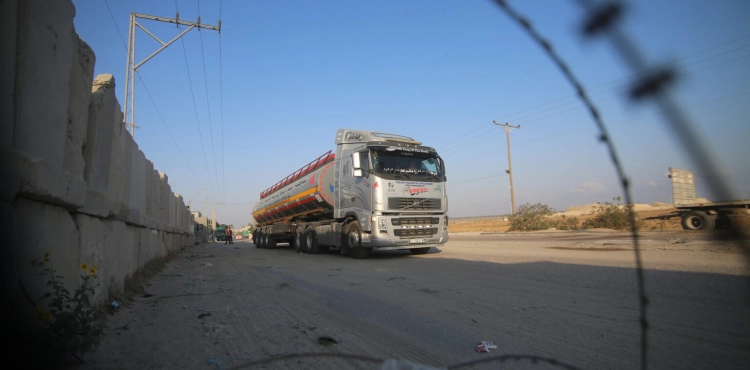Palestinian observers saw that Israel´s easing of restrictions imposed on the Gaza Strip defused a possible confrontation with the Palestinian resistance factions, considering that the decision to expand the fishing area and the return of commercial traffic increases the stability of the calm.
On Thursday, Israel decided to provide more civil facilities to Gaza, including expanding the fishing distance for fishermen to work in the sea from 6 to 12 nautical miles, starting from Friday morning.
The statement added that the decision includes the entry of electrical and agricultural tools from Israel into Gaza, while it will be possible to export metallic waste from the Strip to the Israeli side.
The decision allows the passage of Gaza residents through the Allenby Bridge (Al-Karama Crossing), and will allow the entry of 29 private vehicles left at the Beit Hanoun/Erez crossing since the last wave of escalation last May, according to the statement.
The statement indicated that the civilian steps came at the conclusion of an assessment of the security situation and with the approval of the political echelon, and conditional on the continued maintenance of security stability in the region.
Israel´s decision as a result of mediators´ pressure
. Husam al-Dajni, a political analyst from Gaza, told Xinhua that the announced Israeli facilities came as part of the mediators´ efforts "to prevent things from exploding in light of the indicators that started emerging recently and to warn the armed Palestinian factions."
Al-Dajni considered that the file of resolving the humanitarian crisis in the Gaza Strip, which is inhabited by about two million people, has become a necessity from all parties, including the Israeli government headed by Naftali Bennett.
He considered that re-allowing the fishermen to enter the sea at a distance of 12 miles and an improvement in the work of the only Kerem Shalom commercial crossing with the Gaza Strip, measures that would “prevent the scenario of an explosion of things in Gaza.”
Regarding whether the decisions would satisfy the Palestinian factions, including the Islamic Resistance Movement (Hamas), Al-Dajni stressed that “the complete end of the siege on the Gaza Strip and its quick reconstruction is the solution that satisfies the Palestinians.”
He said that the new Israeli steps could be built on by the mediators, who are trying to make improvements to ease the reality of life in Gaza, which "may postpone the chances of any confrontation."
Israel had closed the Kerem Shalom crossing, after the outbreak of a military escalation on the tenth of last May, which lasted for 11 days with Palestinian armed factions, and led to the killing of more than 250 Palestinians and 13 people in Israel.
On May 21, an Egyptian-brokered truce agreement was reached, which prompted Israel to partially reopen the crossing after nearly 40 days of closure, by exporting clothes and some agricultural products to the West Bank and bringing in a limited number of trucks of goods, including clothes, shoes and medicine.
Israel tightened its siege on Gaza despite the announcement of a ceasefire, at a time when the factions warned of a return to confrontation if efforts to end the siege imposed on the Strip and its reconstruction failed.
The sector witnessed tension on the ground a few days ago, after the resumption of the launching of incendiary balloons towards Israeli settlements.
The situation in Gaza is tragic
. Talal Okal, a political analyst from Gaza, said that the measures taken by Israel came at the request of mediators in light of the difficult humanitarian situation in Gaza, which is witnessing high rates of poverty and unemployment and the delay in the reconstruction process after the recent wave of tension.
Okal believed that Egyptian, Qatari and American parties pressured the Israeli side to make a real initial "breakthrough" in light of the lack of progress in the file of releasing Israeli soldiers with the Islamic Resistance Movement (Hamas) in the Gaza Strip.
He added that if the Palestinian resistance factions returned to sending “messages through the use of coarse tools, such as launching incendiary and booby-trapped balloons,” Israel would respond by stopping all facilities.
The political analyst pointed out that the long past experience of Israeli policy is that it is fixed by conducting a ceasefire agreement through mediators, followed by an agreement on certain understandings, followed by providing initial facilities, and then returning from them.
Okal explained that the announced Israeli facilities towards Gaza “will not satisfy the Palestinian factions, as they were present before the recent wave of tension,” noting that they “give them some time for mediators to intervene in the direction of expanding the circle and addressing the difficult issues at hand.”
According to officials, including Prime Minister Naftali Bennett, Israel is linking the file of the reconstruction of Gaza and the introduction of humanitarian facilities to the Strip with the return of four Israeli soldiers with Hamas in Gaza.
In this regard, the Hebrew newspaper (Haaretz) said yesterday, Friday, that the calm in the Gaza Strip is temporary and Hamas has lost its patience in light of the Israeli measures and has not yet allowed the entry of Qatari funds.
The newspaper said that if the Qatari money reaches Gaza, Hamas realizes that there is another obstacle to it, which is that without an agreement regarding the Israeli soldiers, Israel will allow only limited relief, and therefore Tel Aviv is taking limited measures to relieve the Strip.
The newspaper pointed out that the gap in the positions between the Palestinian parties (Hamas) and the Israelis is still large, and that a new round of events has begun on the Gaza front. According to the newspaper.












